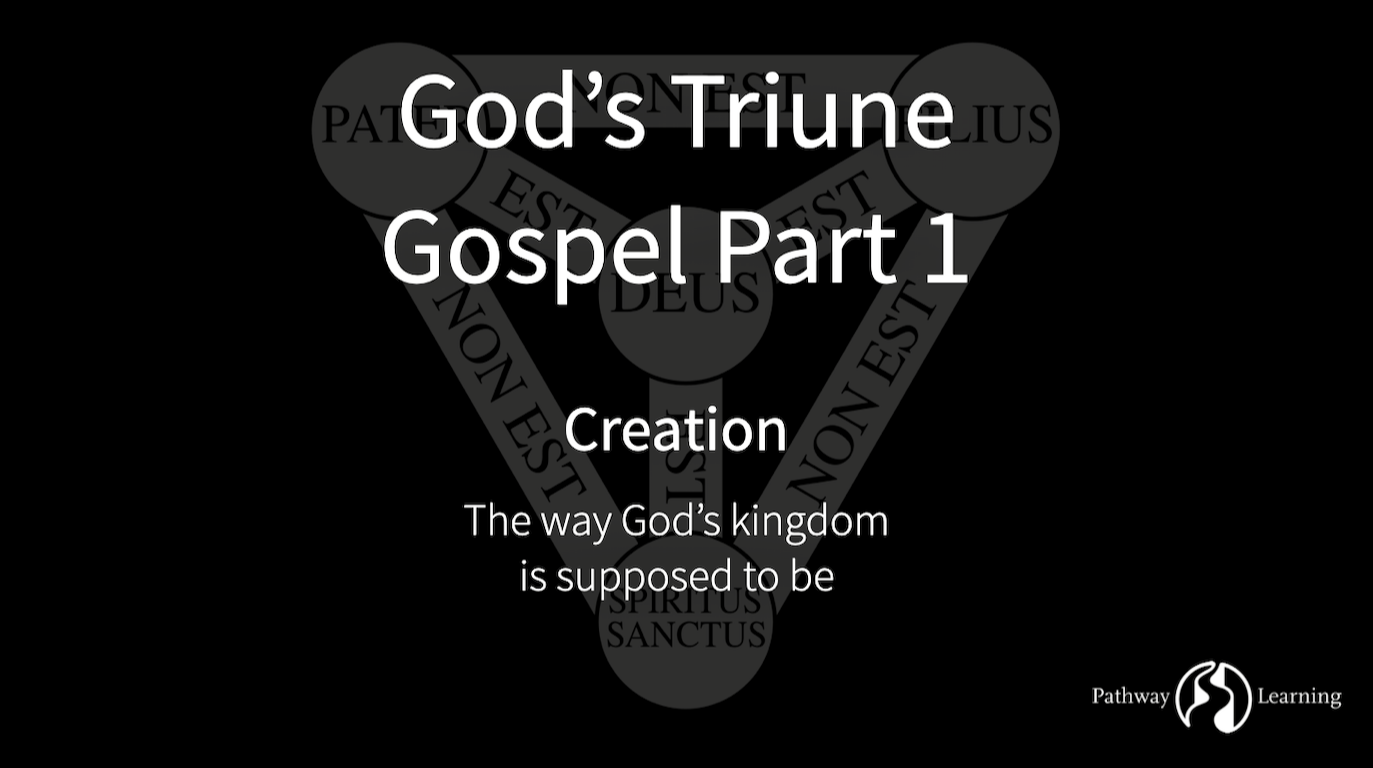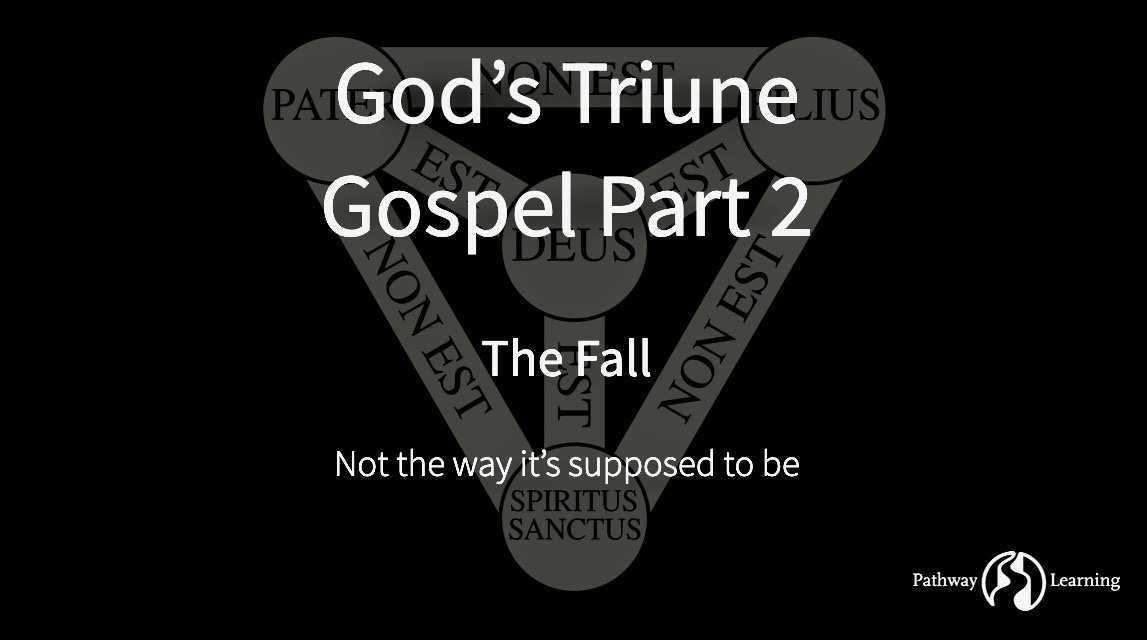God’s Creation and the Fall (Perspectives in Theology, Part 4)
Series: Perspectives in Theology (Part 4)
Authors: Drs. John M. Frame and Steven L. Childers
Title: God’s Creation and the Fall
Gospel means “good news,” and the Bible reveals to us the good news that the Father’s creation, ruined by the Fall, is being redeemed by Christ and restored by the Holy Spirit into the Kingdom of God. In the gospel we see the nature and work of the Triune God reestablishing his kingdom on the earth after the Fall.
To help us better understand this, let’s look first at how God’s original mission for humanity and the world was inaugurated by him at creation – which is the way God’s kingdom is supposed to be. Then we’ll examine how God’s kingdom was overthrown by Satan and sin at the Fall – which is not the way God’s kingdom is supposed to be.
The Father’s Creation: The Way God’s Kingdom Is Supposed to Be
The Scriptures teach that God created the world out of nothing, and then he rested. But God’s work in creation did not stop at the beginning, like the deists’ imagined clockmaker who creates a clock, winds it up, and then steps back to allow the clock to work completely on its own.
Instead, as soon as God rested from his original work of creation, he immediately continued his creative work by sustaining and ruling over everything he had created. This is called God’s providence (Prov 15:3, Ps 104:24). God sustains and rules over all creation not only directly as Sovereign King, but also indirectly through his image bearers, as they cultivate and develop his creation on the earth.
Creation in its original state was good, but it was far from complete. So God made humans through whom he would continue to develop his creation and establish his kingdom on the earth.
When God created the world, he designed the way it’s supposed to operate. So God’s creation includes not only the laws which govern the physical and biological world but also a creative order of laws and norms for the way things are supposed to be.
For example, this creation order includes things like the sanctity of life, the Sabbath rhythm, the institution of marriage, the sanctity of work, and even political order as examples of his creative order (Rom 13:1, 1 Tim 4:3-4, 1 Pet 2:13) for the ultimate flourishing of humanity on earth. God’s plan was for Adam and Eve to develop his creation by multiplying and subduing it according to this creative order.
As Adam and Eve learned how to apply these laws and norms in all their spheres of life, God’s plan was to establish his kingdom on earth through their application of them, developing the whole domain of human relationships and societal organizations for his glory. The result of Adam and Eve developing God’s creative order under their influence is called culture.
The Fall of Humanity: The Way God’s Kingdom is Not Supposed to Be
In the beginning, God created a paradise with a creative order for how things are supposed to be. However, this paradise didn’t last. In Genesis 3 we learn that sin entered the world through Satan, who enticed Adam and Eve to sin.
As a result, humanity became alienated from God and under his just curse. This alienation and curse then flowed, like a polluted river, into all human relationships, including our relationships with God, ourselves, others, and creation.
Because of sin, our original righteous standing before God, which allowed us the blessing of access into God’s holy presence to be loved and cherished by him, is now lost. In its place, we stand condemned, guilty, and forsaken by God.
But sin changes more than our status with God. It also changes our heart, our human nature. We’re not only under sin’s condemning penalty, but also under its domineering power and the control of Satan. Sin causes our hearts to be captured by idols that steal our affections away from God.
Our affections and desires are still good, but because of sin we now set our God-given desires on idols that cannot fully satisfy us. Heart idolatry is looking for our true source of greatest happiness in something or someone other than God. It’s trying to make good things and people ultimate, when only God is ultimate. For some it is approval, reputation, or success. For others it includes things like comfort, control, pleasure, power, or possessions.
Sin’s corruption also spread both in individual hearts and in systemic ways throughout society, corrupting institutions God’s ordained such as the family, church, government, business, education, recreation, and the arts. The curse of sin even spread to our physical bodies, resulting in disease, sickness, and death. (Gen. 3:16-19) All creation and nature itself is now subject to decay. (Rom. 8:18-25)
This is why there is so much brokenness in the world, not just spiritually, but socially, culturally, economically, and politically. And this is why there is so much suffering, violence, poverty, disease, and injustice.
This is not the way God’s kingdom on earth is supposed to be. As a result of the Fall, Satan is now ruling over the earth. Jesus calls him “the ruler of the world” (John 14:30), and the Apostle John writes that “the whole world lies in the power of the evil one.” (1 John 5:19)
This does not mean that Satan is the supreme ruler over the earth. There’s only one supreme Lord over all things, and that’s God who has given Jesus “all authority in heaven and on earth.” (Matt 28:18b) Through Jesus, God will eventually defeat Satan and remove all the effects of his rule on fallen humanity and the world.
But since the Fall, there has been a struggle in history and within every person between the kingdom of God and the kingdom of Satan. This struggle will continue until Jesus returns as King to bring all things into complete submission to his rule and reign on earth.
The good news of the gospel is that, by his grace, God’s good creation of the world and humanity did not lose its original God-ordained order, structure, and laws. The bad news is that sin has deeply corrupted and distorted all of God’s good creation with evil. Sin and evil have radically twisted every part of our individual and communal lives.
All things God created are still good, but since the Fall they can now be used to serve and honor false gods, instead of the true God. For example, God created sexual union to be good and pleasurable, but only within God’s ordained creation structure of marriage between a man and a woman. But after the Fall, sexual union is often used illegitimately, resulting in fornication and adultery.
Similarly, government, industry, education, recreation, and the arts are all inherently good gifts from God, but after the Fall they’re often used in corrupt and idolatrous ways that God never intended.
Our fallen culture and society is not inherently sinful and evil. It’s the distortion and twisting of our culture away from God’s original design that is wrong. So we’re not to separate ourselves from fallen culture, but instead learn how to engage and redirect it according to God’s original design for ultimate flourishing.



